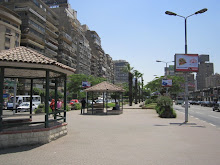An academic term used to describe the socially constructed difference and distance between peoples. The "US" versus the "OTHER."
*******
German Friend once brought up an interesting point about our traveling lives. When we write home and talk about the new cultures we visit, do we lessen them, even if we mean it as compliment? For example when one marvels at a Latin American's dancing skills and sexual appeal, are we representing them as more impulsive and instinctual than our rational selves? Why do we always ignore Central Americas fascinating political history as tourists? It is so easy to attribute "unsavory" traits of a society to "lesser development," and completely ignore the different and yet complex intellectual circles, political happenings, and artist communities. Maybe some of these traits as simply "different" rather than "unsavory." It is so easy to say that "they are 50 years behind," but that suggests that our development is linear (and constantly improving), and other cultures are following the exact same path.
Have you heard of "poverty tourism?" Where western tourists visit famous slums and poor communities, sometimes as a mission of volunteer trip, but often to satisfy their curiosity and verify their difference from The Other. But I have to wonder if it is wrong to want to see this Other if it contributes to their economy? Why wouldn't someone be amazed by a way of life and standard of living so different from their own.
********
When I expressed concern about the prospective male roommate to my school the immediate response was, "But you're American?" It took me a while to convince landlord and school that I was not just this label of "American" without boundaries. I am a person, a female person, and most importantly I was directly expressing discomfort with the situation. I was put into this box of Other and it made things very difficult for me.
This goes both ways. When the fella showed up at my door, and I had expressed my discomfort once again he said, "You know I'm American, right? I'm not one of those Egyptians." He felt the clarification was nessicary because he could speak Egyptian Arabic, and was ethnically Egyptian. I found this insulting. I have many Egyptian friends, and I trust them more than I would trust a generic unknown American male any day. Looking at statistics of sexual assault and rape, being American is by no means a get-out-of-jail-free card. There is this general understanding that Egyptian (maybe even all Arab) males are sexually repressed and more dangerous. But in my personal encounters with people I know, I trust an Egyptian guy to look out for me ten times more than I do an American guy. Maybe this is because Egyptians come from a communitarian culture and the USA has a fend-for-yourself kind of culture. All this being said all Egyptian women will agree that harassment in the streets of Egypt is a major problem.
********
Read this blog entry "Don't Trust What You Read" by a friend of mine on Othering in journalism.
********
Ultimately, this rambling fragmented blog is me thinking out loud about balance as a traveler in a globalized world.
I want to visit some NGOs that work in a Zaballeen settlement, which is a community of impoverished garbage collectors here in Cairo. (They recycle 80% of what they collect compared to "developed countries" 20%!) I enjoy the haphazard markets I stumble upon on poorer areas, and my favorite places are the dingy dirty 'ahwas set up in the streets. Is that bad? Am I one of those tourists? Or am I one of those students that studies these foreign peoples like they are some rare species of ape whose behavior patterns can not be decoded?
When I start to question my motivations for studying in Cairo, I have to force myself to really consider what makes me love this place. Though I enjoy the 'ahwas, I love my friends and family here. Though I find the rugged underbelly of society enticing I am also fascinated by the ever changing politics. I love following Egyptian art, music, and literature which spans popular, underground, historical, current, high society, and lower class. I love the rusty yellow glow of the streets at night when everyone comes out. I am drawn to the hectic unplanned and unfinished developments, but I am also made breathless by the impeccable craftsmanship of Cairo's mosques and churches. I don't love the people here for being “poor and irrational;” I love them for being sarcastic and generous.
I don't have answers to my questions. I don't know if I love Egypt for the right reasons. (I think about this more and more as I keep being asked, "Do you think you'll move here some day?" Funny, I thought I had already moved here...) I don't know if there will ever be a way for people from different cultures to not only see each other objectively, but also see each other as diverse protean nebulas rather than oversimplified Others. I think the only conclusion I can come to is that I and any other traveler must be open to complexity, and the possibility that large portions of the Other might not be so different after all.
I can also conclude I think way too much.



No comments:
Post a Comment